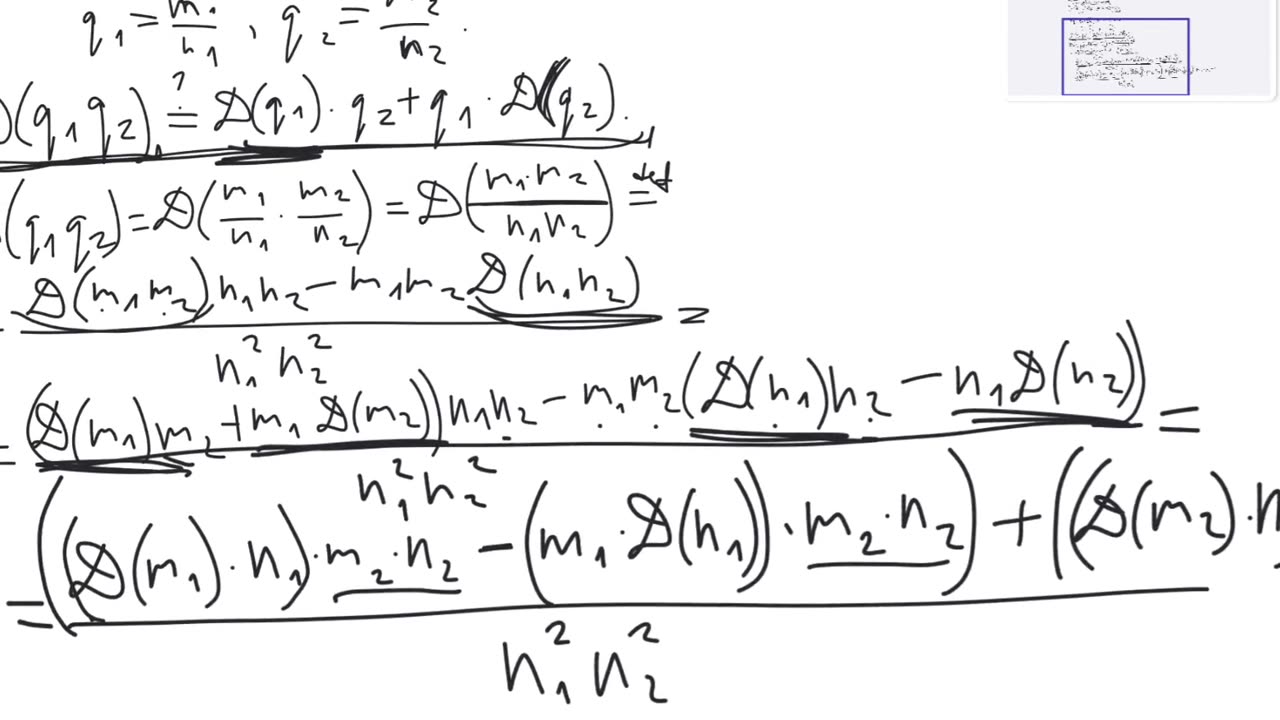Premium Only Content

Quotient rule and extending arithmetic derivative to rational numbers | number theory | advanced
Episode 106.
Quotient rule and extending arithmetic derivative to rational numbers | number theory | advanced.
The quotient rule for the arithmetic derivative and extending the arithmetic derivative to the rational numbers | number theory | advanced level.
Branch of mathematics: number theory.
Difficulty level: advanced.
The arithmetic derivative is a function $D$ from natural numbers to natural numbers defined by the 2 properties:
1. For any prime number $p$, we have $D(p)=1$.
2. For any 2 natural numbers $m$ and $n$, we have $D(m \cdot n) = D(m) \cdot n + m \cdot D(n)$.
It can be proven that the quotient rule holds: for any natural numbers $m$ and $n$ such that $m$ is divisible by $n$, we have $D(\frac{m}{n})=\frac{D(m)n-mD(n)}{n^2}$.
The quotient rule also holds for integer numbers for the extension of $D$ to integer numbers.
It can be extended to all rational numbers using this quotient rule as a definition: for any rational number $q$ expressed as $q=\frac{m}{n}$ for integer numbers $m$ and $n$, we define $D(q)=\frac{D(m)n-mD(n)}{n^2}$. It can be proven that this definition is correct (that is, it does not depend on the choice of $m$ and $n$ for the same $q$), and that, with this definition, the product rule holds for all rational numbers.
Mathematics. Number theory.
#Mathematics #NumberTheory
The same video on YouTube:
https://youtu.be/dxau-oNS7K4
The same video on Telegram:
https://t.me/mathematical_bunker/131
-
 47:39
47:39
Michael Franzese
3 hours agoJewelry King Trax NYC EXPOSES How the Powerful Steal from You
32.6K7 -
 LIVE
LIVE
Slightly Offensive
3 hours agoCandace REDPILLS the Masses in BOMBSHELL Theo Von Interview | Guest: Shane Cashman
1,052 watching -
 LIVE
LIVE
megimu32
2 hours agoON THE SUBJECT: IRL Streamers Attacked & Nostalgic Animal Movies That Made Us Cry
348 watching -
 1:00:54
1:00:54
The Tom Renz Show
6 hours agoMore Epstein/FBI, a Scary Trade War, & the Dem Echo Chamber
829 -
 40:43
40:43
Kimberly Guilfoyle
7 hours agoDems Double Down on Delusion-Why? Live with Tony Kinnett & Bo French | Ep.202
61.7K30 -
 1:28:42
1:28:42
Redacted News
5 hours agoBREAKING! SOMETHING BIG IS HAPPENING IN EUROPE ALL OUT WAR IS COMING AGAINST RUSSIA, TRUMP FURIOUS
108K252 -
 47:50
47:50
Candace Show Podcast
5 hours agoBREAKING: Judge Makes Statement Regarding Taylor Swift's Text Messages. | Candace Ep 155
94.3K102 -
 DVR
DVR
Josh Pate's College Football Show
2 hours agoCFB’s Most Hated Teams | FSU & Clemson Future | Big Ten Win Totals | Star Rankings Overrated?
5.76K -
 1:33:47
1:33:47
CatfishedOnline
4 hours agoGoing Live With Robert - Weekly Recap
19.4K -
 55:18
55:18
LFA TV
1 day agoEurope’s Sudden Turn Against America | TRUMPET DAILY 3.6.25 7PM
25.5K3